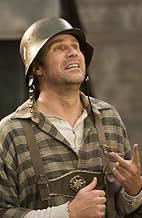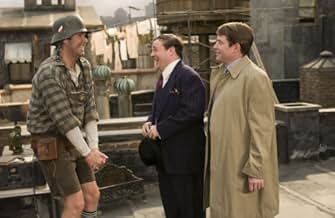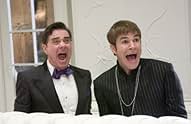After putting together another Broadway flop, down-on-his-luck producer Max Bialystock teams up with timid accountant Leo Bloom in a get-rich-quick scheme to put on the world's worst show.After putting together another Broadway flop, down-on-his-luck producer Max Bialystock teams up with timid accountant Leo Bloom in a get-rich-quick scheme to put on the world's worst show.After putting together another Broadway flop, down-on-his-luck producer Max Bialystock teams up with timid accountant Leo Bloom in a get-rich-quick scheme to put on the world's worst show.
- Awards
- 1 win & 17 nominations
Storyline
Did you know
- TriviaAfter Max (Nathan Lane) and Leo (Matthew Broderick) do Der Guten Tag Hop Clop with Franz (Will Ferrell), Max tries to pull open the door. When it doesn't open, he shouts, "We're trapped!" This is an inside joke from the play's run in England. One night, a stage hand had locked the door. When Nathan Lane tried it, he realized it was locked and shouted out, "We're trapped! Trapped like rats with a crazy Nazi!" A stage hand then went up and unlocked the door and they got out.
- GoofsThe older male dancer who says "Don't be stupid, be a schmarty..." is speaking with Mel Brooks' voice on his first appearance. The next time he is heard delivering a line, he has a completely different, deep voice. However, this is deliberate: the character also lip syncs to Mel Brooks' recorded voice in the stage production.
- Quotes
Leo Bloom: Let's assume for a moment, that you are a dishonest man.
Max Bialystock: Assume away.
- Crazy creditsFor the closing credits, Will Ferrell (in the character of Franz Liebkind) recorded "The Hop-Clop Goes On" - a slower version of "Der Guten Tag Hop-Clop" that parodies "My Heart Will Go On" from "Titanic" right down to the cheesy instrumentals. At the end of the song, Franz whispers to the audience: "Don't forget to purchase 'Mein Kampf' in paperback. You can find it at Borders... or Barnes and Noble...und Amazon.com"
- ConnectionsFeatured in HBO First Look: The Producers (2005)
- SoundtracksThere's Nothing Like a Show on Broadway
Music and Lyrics by Mel Brooks
Performed by Nathan Lane and Matthew Broderick
Featured review
This is the third incarnation of the story of The Producers, where two producers attempt to put a giant flop on Broadway then take all the money and run away, and this one is the one that works least well. That doesn't mean it's bad, it's like saying that someone is the dumbest of the Nobel Prize winning Physicists. The story is VERY good, and a great set up for some incredibly entertaining characters and situations.
This version is based on the multi-award-winning Broadway musical, which was based on the original movie starring Zero Mostel and Gene Wilder. Replacing them in the roles of Max Bialystock and Leo Bloom are Nathan Lane and Matthew Broderick, who are reprising their roles on stage. Also in the cast are Uma Thurman as Ulla, Will Ferrell as Nazi playwright Franz Lebkind, and Gary Beach and Roger Bart as "common-law partners" Rodger DeBris and Carmen Ghia. There are also several cameos peppering the movie, including Deborah Monk, Andrea Martin, John Lovitz, Michael McKean, Thomas Meehan, and even Mel Brooks. All the performances are very good overall, despite some snags here and there. Thurman seems to pop in and out of accent and Broderick takes some time to warm up to what turns out to be his best performance since "Ferris Buller's Day Off". The standout performance was Roger Bart, who is having a banner year now that he has finished his role of the insane pharmacist on TV's Desperate Housewives. Bart easily steals every scene that he's in, which is no small feat considering the list of talent in this film. Lane, as usual, proves that he is a dynamo of energy that, fortunately, can be guided and utilized to produce amazing things. He easily carries this film.
The entire look of the film is very stylized. And that stylization is, unfortunately, very stagey. This is director Susan Strohman's first film, and it shows that up until now she has worked exclusively in theatre. Much of the movie lacks interesting camera work--the characters are in the center, framed nicely, while they perform their play. There is also a good deal of talking directly to the camera. This is certainly not the first movie that has done this. It's not even the first time that Matthew Broderick has done this (see "Ferris Buller's Day Off"). At first it is a little distracting, but Strohman is smart in that she realizes that this is the style of the piece, and she sticks to it throughout the entire film. Indeed, the first and last people we see are talking directly to the camera (Stick around after the credits, by the way). The way that the film is staged also makes it seem stagey. There are many jokes and bits of scenery moving that are more fitting for a stage than a screen.
I don't mean to make this sound like a bad thing, after all, who says that movies must follow such strict guidelines? I enjoyed the film greatly, and there were many things about it that I think other directors could learn from (especially directors of movie-musicals). The main thing that this movie achieves over other musicals, "Chicago" or "Rent" for example, is that Strohman allows us to watch the performers perform the musical numbers. They're NOT over-edited like the other two musicals I mentioned. It was a remembrance of the golden days of movie musicals where shots lasted forever, and we actually got to see the actors dance. Make no mistake about it, Strohman is an AMAZING choreographer. The numbers "I Wanna Be A Producer" and "That Face" show that she really does rank up there with the great choreographers of movie and Broadway history.
Many people ask why film this version? It's not as good as the original, and it works better on stage than on film. The answer seems to be that a $10 movie ticket is cheaper than a $100 theatre ticket, and now a wider audience gets to see the great performances. And they should. Despite the movie's flaws, it is incredibly funny.
This version is based on the multi-award-winning Broadway musical, which was based on the original movie starring Zero Mostel and Gene Wilder. Replacing them in the roles of Max Bialystock and Leo Bloom are Nathan Lane and Matthew Broderick, who are reprising their roles on stage. Also in the cast are Uma Thurman as Ulla, Will Ferrell as Nazi playwright Franz Lebkind, and Gary Beach and Roger Bart as "common-law partners" Rodger DeBris and Carmen Ghia. There are also several cameos peppering the movie, including Deborah Monk, Andrea Martin, John Lovitz, Michael McKean, Thomas Meehan, and even Mel Brooks. All the performances are very good overall, despite some snags here and there. Thurman seems to pop in and out of accent and Broderick takes some time to warm up to what turns out to be his best performance since "Ferris Buller's Day Off". The standout performance was Roger Bart, who is having a banner year now that he has finished his role of the insane pharmacist on TV's Desperate Housewives. Bart easily steals every scene that he's in, which is no small feat considering the list of talent in this film. Lane, as usual, proves that he is a dynamo of energy that, fortunately, can be guided and utilized to produce amazing things. He easily carries this film.
The entire look of the film is very stylized. And that stylization is, unfortunately, very stagey. This is director Susan Strohman's first film, and it shows that up until now she has worked exclusively in theatre. Much of the movie lacks interesting camera work--the characters are in the center, framed nicely, while they perform their play. There is also a good deal of talking directly to the camera. This is certainly not the first movie that has done this. It's not even the first time that Matthew Broderick has done this (see "Ferris Buller's Day Off"). At first it is a little distracting, but Strohman is smart in that she realizes that this is the style of the piece, and she sticks to it throughout the entire film. Indeed, the first and last people we see are talking directly to the camera (Stick around after the credits, by the way). The way that the film is staged also makes it seem stagey. There are many jokes and bits of scenery moving that are more fitting for a stage than a screen.
I don't mean to make this sound like a bad thing, after all, who says that movies must follow such strict guidelines? I enjoyed the film greatly, and there were many things about it that I think other directors could learn from (especially directors of movie-musicals). The main thing that this movie achieves over other musicals, "Chicago" or "Rent" for example, is that Strohman allows us to watch the performers perform the musical numbers. They're NOT over-edited like the other two musicals I mentioned. It was a remembrance of the golden days of movie musicals where shots lasted forever, and we actually got to see the actors dance. Make no mistake about it, Strohman is an AMAZING choreographer. The numbers "I Wanna Be A Producer" and "That Face" show that she really does rank up there with the great choreographers of movie and Broadway history.
Many people ask why film this version? It's not as good as the original, and it works better on stage than on film. The answer seems to be that a $10 movie ticket is cheaper than a $100 theatre ticket, and now a wider audience gets to see the great performances. And they should. Despite the movie's flaws, it is incredibly funny.
Details
- Release date
- Country of origin
- Languages
- Also known as
- The Producers: The Movie Musical
- Filming locations
- Production companies
- See more company credits at IMDbPro
Box office
- Budget
- $45,000,000 (estimated)
- Gross US & Canada
- $19,398,532
- Opening weekend US & Canada
- $154,590
- Dec 18, 2005
- Gross worldwide
- $38,075,318
- Runtime2 hours 14 minutes
- Color
- Sound mix
- Aspect ratio
- 2.39 : 1
Contribute to this page
Suggest an edit or add missing content







































